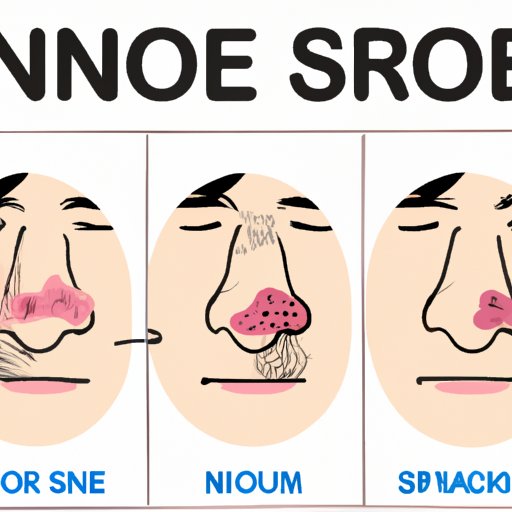Introduction
A blocked nose, also known as nasal congestion, is an extremely common condition that affects people of all ages. It occurs when the nasal passages become inflamed, causing them to swell and become blocked, making it harder to breathe through the nose. Allergens, such as dust or pet hair, environmental irritants, colds and flu, sinus infections, and even certain medications can cause a blocked nose. In this article, we’ll explore how to get better sleep when you have a stuffy nose and the best position to sleep in when you have a congested nose.

How to Sleep Comfortably with a Blocked Nose
Sleeping with a blocked nose can be very uncomfortable, but there are some steps you can take to make it easier. Here are some tips for sleeping easily with a stuffy nose:
- Keep your bedroom cool and well-ventilated. Cold air helps reduce inflammation in the nasal passages and makes it easier to breathe.
- Use a humidifier to add moisture to the air. This helps reduce irritation in the nasal passages and makes it easier to breathe.
- Sleep on your side with your head elevated. This helps keep your airways open and makes it easier to breathe.
- Invest in a special pillow designed for people with allergies. These pillows are designed to help reduce inflammation in the nasal passages.
- Avoid eating heavy meals before bed. Eating late at night can cause heartburn, which can make it harder to breathe.
In addition to these tips, there are also several natural remedies you can try to help unblock your nose and get better sleep. Some of these remedies include drinking hot liquids, taking a steamy shower, using a saline nasal spray, and applying a warm compress to the nose and face.
The Best Position to Sleep in When You Have a Congested Nose
When you have a blocked nose, it can be difficult to get comfortable enough to fall asleep. Studies have shown that sleeping on your side is the best position for people with nasal congestion. According to research conducted by the National Institute of Health, “sleeping on the side is beneficial because it allows the upper airway to remain more open than if the person were sleeping on their back.”
Sleeping on your side also has other benefits. It can help reduce snoring, reduce acid reflux, and improve circulation. Additionally, side sleeping can also help relieve pressure on your spine, reducing back pain.
On the other hand, sleeping on your back can make it harder to breathe when you have a blocked nose. This is because gravity pulls the tongue and other soft tissues down, blocking the airway. Sleeping on your back can also cause snoring and worsen acid reflux.

What to Do When Your Nose is Blocked and You Need to Sleep
If your nose is blocked and you need to sleep, there are a few strategies you can try to help you get better rest. First, try using a neti pot or nasal irrigation device to flush out the nasal passages. This can help clear out any mucus or allergens that may be blocking your airways. Additionally, you can try using a mentholated ointment or balm, such as Vicks Vaporub, to help reduce inflammation in the nasal passages and make it easier to breathe.
If your blocked nose is caused by allergies, you can try taking an antihistamine before bedtime. Antihistamines can help reduce inflammation in the nasal passages and make it easier to breathe. However, it’s important to check with your doctor before taking any over-the-counter medications.
Finally, if your blocked nose is caused by a cold or flu, you can try taking a decongestant or expectorant to help loosen up the mucus and make it easier to breathe. Again, it’s important to check with your doctor before taking any medications.
Conclusion
Having a blocked nose can make it difficult to sleep, but there are steps you can take to make it easier. Try keeping your bedroom cool and well-ventilated, using a humidifier, sleeping on your side with your head elevated, and using a special pillow designed for people with allergies. Additionally, there are several natural remedies you can try to help unblock your nose and get better sleep. Finally, if your blocked nose is caused by allergies, a cold or flu, you should talk to your doctor about taking an appropriate medication.
Sleeping with a blocked nose can be uncomfortable, but it doesn’t have to be impossible. With the right strategies and tips, you can get the restful sleep you need. If your symptoms persist or worsen, you should seek medical help.
(Note: Is this article not meeting your expectations? Do you have knowledge or insights to share? Unlock new opportunities and expand your reach by joining our authors team. Click Registration to join us and share your expertise with our readers.)
